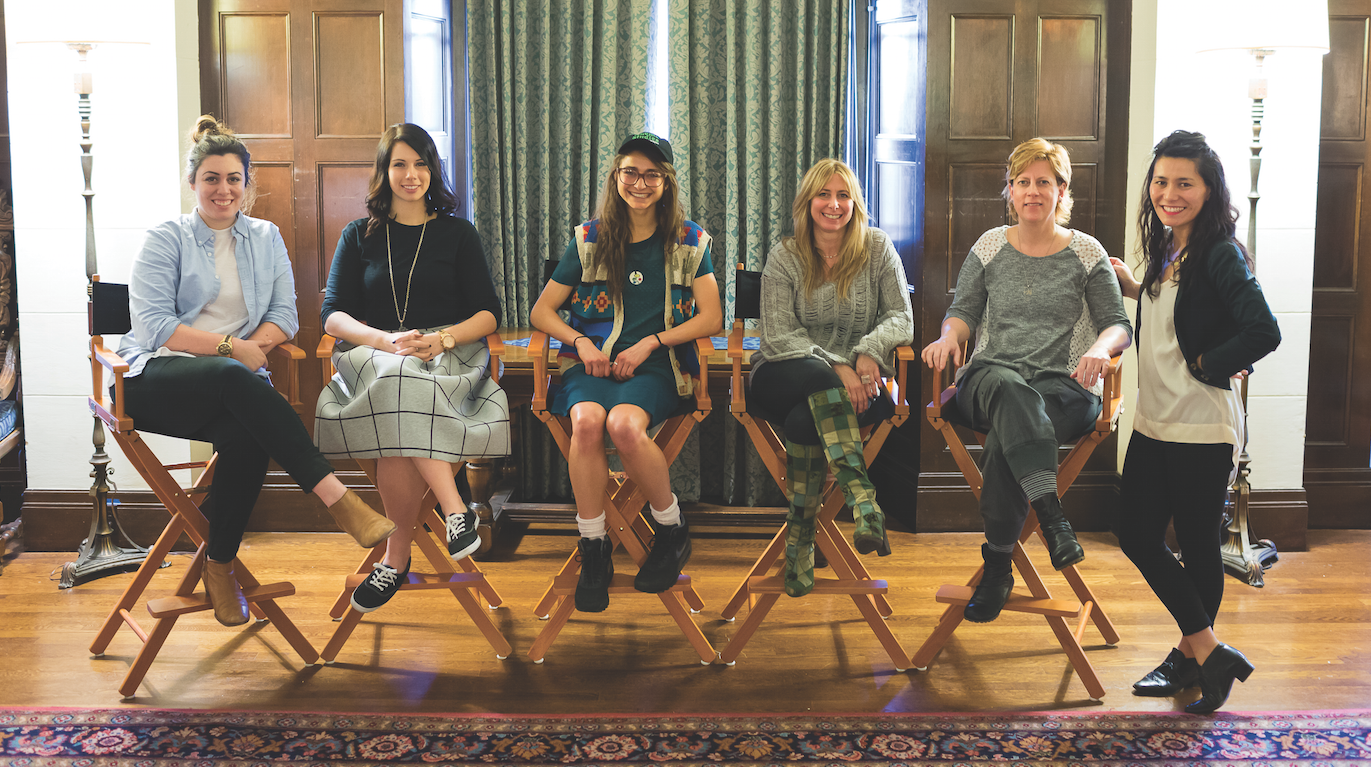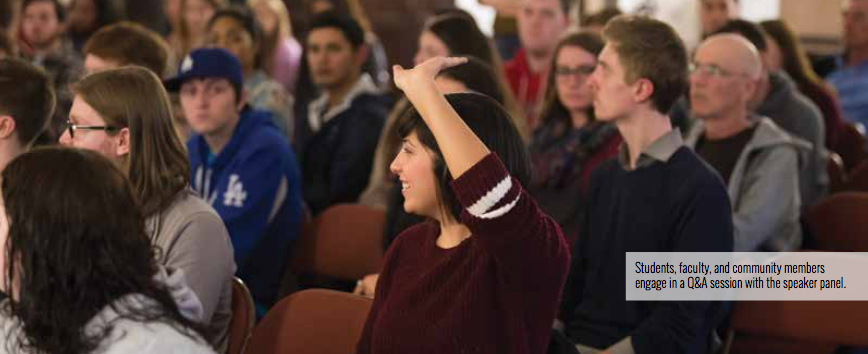Story by Hannah Osborn
Photos by Joshua Rainey

The winter term 2015 Working Filmmakers Series featured a panel discussion of speakers (left to right): Melanie Bowman, BA ’13; Kate Schnabel, BA ’14; Alexi Pappas, MA ’14; Naomi Yospe; and Juliana Lukasik. Cinema Studies Instructor Masami Kawai (far right) moderated the event.
Creating a Career in Cinema
Landing a job in the film industry is a top priority for soon-to-be Cinema Studies graduates. Advisors, professors, and industry professionals alike suggest that networking is one of the best tools in the job search process. The Cinema Studies Program launched the Working Filmmakers Series in 2010, bringing industry professionals to campus to talk with students about what it takes to get a job, work in the industry, and build connections.
The 2015 Working Filmmakers event, “Creating Your Career in Cinema,” featured a panel discussion and networking session with five industry professionals, including recent Cinema Studies alumni, from a variety of backgrounds—everything from directing and filmmaking to various roles in production. “Our goal was to bring together a panel of speakers who work in different areas of the industry so students could learn the many ways in which they can put their studies to work,” states Student Services Assistant Director Shauna Riedel-Bash. The standing-room-only crowd was captivated as the panel discussed their experiences finding jobs and working in the industry while offering networking suggestions for students preparing to enter the job market.
“The best advice I could offer a current Cinema Studies student is to network and figure out what you want, and don’t be afraid to ask for it because people respond to that,” panel speaker Melanie Bowman said. Bowman, who graduated from Cinema Studies in 2013, took her own advice. She landed a position as the lead producer for Sawhorse Productions by conducting informational interviews in Los Angeles during spring break of her senior year and began producing a wide range of digital content for Condé Nast Entertainment—Teen Vogue, Glamour, Vanity Fair, GQ, and Golf Digest.
Kate Schnabel, Cinema Studies alum from the class of 2014, provided students with insight into how she obtained a coveted position as a production assistant for the television show Portlandia. Schnabel first enrolled in the “Cinema Careers” course. Skills learned in the class helped her land a summer internship with the show after her sophomore year, and she subsequently was hired back as the line producer’s assistant while still in school. “Get started as soon as possible,” Schnabel advised students. “Graduating with three seasons of a show under my belt has made the transition to the real world a lot easier for me. I graduated with an abundance of connections, and I wasn’t worried to enter the production field.”
“Become indispensable.
It’s like Survivor—be the
person who no one will ever
want to vote off the island.”
Juliana Lukasik
Creative Director
Cappelli Miles
Both Bowman and Schnabel enrolled in the “Cinema Careers” course when they were students and then returned to the class as alumni to share their experiences working in the industry. “The ‘Cinema Careers’ course is designed to help students synthesize their college experiences and communicate their skills to prospective employers. Meeting with recent Cinema Studies alumni and hearing advice about how to get started in the industry is incredibly valuable to current students,” remarked Riedel-Bash, instructor of the course.
The Working Filmmakers panel included Juliana Lukasik, creative director at Cappelli Miles, who has been a valuable partner of the Cinema Studies Program, serving as a mentor to students and providing job shadow opportunities to Cinema Studies majors. She had excellent advice for students hoping to get hired after landing an internship or temporary entry-level position: “Become indispensable. It’s like Survivor—be the person who no one will ever want to vote off the island.”
As for surviving in the fast-paced film industry, recent UO graduates shared words of encouragement. Schnabel reminded students that the profession was not necessarily glamorous, lucrative, or filled with days of meeting famous people. Rather, the profession requires hard work and dedication: “You have to be willing to put in the work to get what you want out of it.” Alexi Pappas, who received her MA from the University of Oregon in 2014 in Interdisciplinary Studies with a focus on film, directed and starred in the upcoming movie Tracktown. Pappas likened her work in independent filmmaking to running. She stressed the importance of “staying on your own team” during the hard times because nobody will ever believe in your project as much as you do. Naomi Yospe, freelance film and television production coordinator, offered advice that all students should take to heart as they enter their postgraduate careers: “Just open up as many avenues as you can, and keep them open.”
The panel also discussed the topic of gender challenges faced in the film industry. Cinema Studies Career Instructor Masami Kawai, who moderated the event, offers advice on this topic, “I would encourage students to learn from the richness of global cinema history and to create new work that the film industry can’t ignore. I would also encourage UO students to continue to value voices that are often overlooked and underrepresented. Valuing diversity will be an asset to their futures in an increasingly more international film market as well as an asset to create a richer film culture and a dynamic work environment.”
Through a combination of critical studies, creative work, speaker events, and networking opportunities, Cinema Studies provides students with the skills necessary to create a career in cinema. “We are excited to help students find their passion and look forward to bringing more speakers to campus to enrich the students’ overall experience,” remarked Riedel-Bash.


